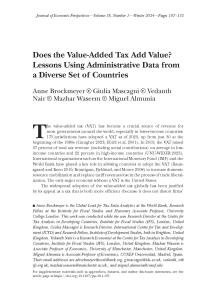This is the final report of an evaluation for the European Commission of the consequences, in economic terms, of the functioning of the most pertinent elements of the current EU VAT system.
This full report consists of 11 chapters covering areas including: VAT exemptions and their economic effects; reduced and zero rates and their distributional, welfare and behavioural consequences; administration and compliance costs; VAT fraud; the operation of VAT in a cross-border context; the impact of the EU VAT system on cross-border trade flows; and, the impact of VAT on GDP, consumption and labour markets. It finds that although, in principle, VAT has many advantages compared to other taxes, there are significant problems with how it is currently implemented and operated in the EU. Thus, firm and consumer behaviour is distorted, cross-border trade is made more costly and difficult, compliance burdens are high and regressive and the system is open to significant levels of fraud. This means productivity, output and consumption are lower than they should be.










